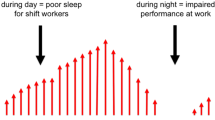Abstract
Sleep is a form of rejuvenation, which can be treated as a source of energy. This energy is available in limited quantities and individuals must decide when it should be renewed and when it should be consumed. Sleeping involves investing in energy and alertness but also a sacrifice of time. We derive and solve the inter-temporal utility-maximization problem on the length of sleep to obtain optimality conditions for the length of sleep. Several applications emerge from the analysis. These include the effects of labor-market opportunities on sleep patterns; the effect of having children; the consequences of decreased division of labor within the household; and the relationship between sleep deprivation and obesity. When data allows, those outcomes are tested using panel data from Iceland. The empirical results are consistent with the predictions of the theoretical model.
Similar content being viewed by others
Notes
Surprisingly, the effects on health are not clear as several studies have shown sleep duration of more than 7–8 h per day to be associated with increased mortality. Causal links are currently speculative: the available data may reflect such things as depression, socioeconomic status, or even alcohol use, as these studies can only be used to determine correlation, but not causation (Patel et al. 2004, 2006a; Ferrie et al. 2007; Born et al. 2006).
The second-order condition is satisfied: −2a s = −2α1 < 0 since a ss = 0 given our functional form.
The second-order condition for a maximum is satisfied since the Hessian matrix is negative definite.
The second-order condition for a profit maximum is satisfied: \( - 2\beta_{1} < 0. \)
The second derivative is negative:
\( U_{1}^{''} \left( \cdot \right)\left[ {\left( {T - s_{t} } \right)\beta_{1} - \left( {\beta_{0} + \beta_{1} r_{t} } \right)} \right]^{2} - 2\beta_{1} U_{1}^{'} \left( \cdot \right) + RU_{2}^{''} \left( \cdot \right)\left( {T - s_{t + 1} } \right)^{2} \left( {1 - f} \right)^{2} \bar{\beta }_{1}^{2} \, < \, 0 \).
In that raising one's own children is usually not remunerated, having children may be viewed as a form of leisure. In that children may support their parents at later stages of the life cycle, having children may be viewed as work (investment). For analytical purposes, time spent on children is however separated from time spent working and enjoying leisure in this analysis.
The reader is directed to Waldfogel (1997) for a review of studies on how changes in family structure affect the labor market.
John Harlow, “Study finds we get 31 h into a day: Multitasking make the modern man,” The Sunday Times, April 13, 2008.
Public Health Institute of Iceland: Heilsa og líðan.
As the empirical presentations here are meant to show relationships between the variables of interest implied by the theoretical model, rather than to precisely map the sleep behavior of the Icelandic population, results are presented without sample weights.
It should, however, be noted that this overall association between wages and sleep duration, ambiguously predicted by theory, was the only relationship reported in this paper that was not fully consistent across different empirical robustness checks.
References
Aeschbach D, Sher L, Postolache TT, Matthews JR, Jackson MA, Wehr TA (2003) A longer biological night in long sleepers than in short sleepers. J Clin Endocr Metab 1:26–30
Becker GS (1985) Human capital, effort, and sexual division of labor. J Labor Econ 3:33–59
Biddle JE, Hamermesh DS (1990) Sleep and the allocation of time. J Polit Econ 98:922–943
Bonnet MH, Arand DL (2003) Insomnia, metabolic rate and sleep restoration. J Intern Med 254:23–31
Born J, Rasch B, Gais S (2006) Sleep to remember. Neuroscientist 12:410
Chaput JP, Després JP, Bouchard C, Tremblay A (2008) The association between sleep duration and weight gain in adults: a 6-year prospective study from the Quebec family study. Sleep 31:517–523
Contoyannis P, Jones AM (2004) Socio-economic status, health and lifestyle. J Health Econ 23:965–995
Ferrie JE, Shipley MJ, Cappuccio FP, Brunner E, Miller MA, Kumari M, Marmot MG (2007) A prospective study of change in sleep duration; associations with mortality in the Whitehall II cohort. Sleep 30:1659–1666
Grossman M (1972) On the concept of health capital and the demand for health. J Polit Econ 80:223–255
Jónsson SH, Guðlaugsson JO, Gylfason HF, Guðmundsdóttir DG (2011) Heilsa og líðan Íslendinga 2007: Framkvæmdaskýrsla. Reykjavík: Lýðheilsustöð. http://www.lydheilsustod.is/rannsoknir/heilsa-og-lidan-2007. Accessed 15 March 2011
Kohatsu ND, Tsai R, Young T, Van Gilder R, Burmeister LF, Stromquist AM, Merchant JA (2006) Sleep duration and body mass index in a rural population. Arch Intern Med 166(16):1701–1705
Patel SR, Ayas NT, Malhotra MR, White DP, Schernhammer ES, Speizer FE, Stampfer MJ, Hu FB (2004) A prospective study of sleep duration and mortality risk in women. Sleep 27(3):440–444
Patel SR, Malhotra A, Gottlieb DJ, White DP, Hu FB (2006a) Correlates of long sleep duration. Sleep 29(7):881–889
Patel SR, Malhotra A, White DP, Gottlieb DJ, Hu FB (2006b) Association between reduced sleep and weight gain in women. Am J Epidemiol 164(10):947–954
Statistics Iceland (2011) Price index. http://www.statice.is/Statistics/Prices-and-consumption/Consumer-price-index. Accessed 20 May 2011
Szalontai G (2006) The demand for sleep: a South African study. Econ Model 23:854–874
Turner TH, Drummond SPA, Salamat JS, Brown GG (2007) Effects of 42 hr sleep deprivation on component processes of verbal working memory. Neuropsychology 21:787–795
Van Cauter E, Knutson K, Leproult R, Spiegel K (2005) The impact of sleep deprivation on hormones and metabolism. Medscape Neurol Neurosurg 7(1). http://www.medscape.org/viewarticle/502825
Van Dongen HP, Maislin G, Mullington JM, Dinges DF (2003) The cumulative cost of additional wakefulness: dose-response effects on neurobehavioral functions and sleep physiology from chronic sleep restriction and total sleep deprivation. Sleep 26(2):117–126
Van Dongen HP, Vitellaro KM, Dinges DF (2005) Individual differences in adult human sleep and wakefulness: Leitmotif for a research agenda. Sleep 28(4):479–496
Waldfogel J (1997) The effect of children on women’s wages. Am Sociol Rev 62(2):209–217
Walsh JK, Engelhardt CL (1999) The direct economic costs of insomnia in the United States for 1995. Sleep 22:386–393
Webb WB (1985) Sleep in industrialized settings in the northern hemisphere. Psychol Rep 57(2):591–598
Wyatt JK, Ritz-De Cecco A, Czeisler CA, Dijk DJ (1999) Circadian temperature and melatonin rhythms, sleep, and neurobehavioral function in humans living on a 20-h day. Am J Physiol 277(4):R1152–R1163
Yaniv G (2004) Insomnia, biological clock, and the bedtime decision: an economic perspective. Health Econ 13:1–8
Acknowledgments
We are indebted to Michael Grossman, Dhaval Dave, Ching-to Albert Ma and an anonymous referee for insightful comments and suggestions. Financial support from The Icelandic Research Fund (RANNIS) is acknowledged.
Author information
Authors and Affiliations
Corresponding author
Rights and permissions
About this article
Cite this article
Asgeirsdottir, T.L., Zoega, G. On the economics of sleeping. Mind Soc 10, 149–164 (2011). https://doi.org/10.1007/s11299-011-0086-5
Received:
Accepted:
Published:
Issue Date:
DOI: https://doi.org/10.1007/s11299-011-0086-5




